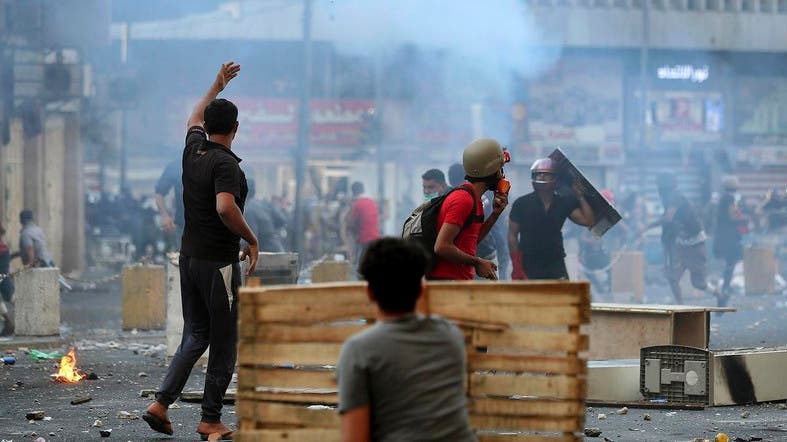Iraqi security forces killed at least five people on Saturday as they pushed protesters back towards their main camp in central Baghdad using live ammunition, tear gas and sound bombs, police and medics said.
The clashes wounded scores more people and put security forces back in control of all except one major bridge linking the Iraqi capital’s eastern residential and business districts to government headquarters across the Tigris river.
Despite government pledges of reform, security forces have used lethal force since the start and killed more than 280 people across the country.
On Saturday, forces drove protesters back from some of the bridges they had tried to occupy during the week and towards Tahrir Square, the main gathering point for demonstrators.
The protesters still hold a portion of the adjacent Jumhuriya Bridge where they have erected barricades in a stand-off with police.
But demonstrators fear the next target will be Tahrir Square and Jumhuriya Bridge.
“Police have re-taken almost the entire area up ahead of us. They’re advancing and my guess is tonight they’ll try to take Tahrir,” said one protester, who gave his name only as Abdullah.
Reform promised, clashes flare
On Saturday, some demonstrators threw Molotov cocktails towards security forces at another bridge, and young men brought unlit homemade petrol bombs up a tower block nearby, preparing for further clashes.
At a nearby makeshift clinic, volunteer medic Manar Hamad said she had helped treat dozens of wounded on Saturday alone.
“Many get hit by shrapnel from sound bombs and others choke on tear gas or are hit directly by gas canisters. People have died that way,” she said as live gunfire rang out and ambulance sirens wailed.
Police and medics said five people were shot to death and more than 140 wounded in Baghdad on Saturday. A Reuters cameraman saw one man carried away by medical volunteers after a tear gas canister struck him directly in the head.
As the violence flared, Abdul Mahdi issued a statement which appeared to take a more conciliatory tone and urged a return to normal life after weeks of unrest that have cost the country tens of millions of dollars, although crucial oil exports have not been affected.
Earlier on Saturday, Iraqi Prime Minister Adil Abdul Mahdi said that the government and judiciary will continue to investigate deaths and that all detainees will be released, promising a new electoral reform “in the coming few days.”
“Political forces and parties are important institutions in any democratic system, and have made great sacrifices, but they’ve also made many mistakes,” he said.
He said protests were a legitimate engine of political change but urged demonstrators not to interrupt “normal life”.
Abdul Mahdi promised electoral reform and said authorities would ban possession of weapons by non-state armed groups who have been accused of killing protesters, and that there would be investigations in demonstrator deaths.
On Friday, Iraq’s powerful senior Shi’ite Muslim cleric said that it was up to the security forces to make sure protests do not descend into further violence, and urged the government to respond to demonstrators’ demands as soon as possible.
“The biggest responsibility is on the security forces,” a representative of Grand Ayatollah Ali al-Sistani said in a sermon after Friday prayer in the Shia Muslim holy city of Kerbala.
Al-Sistani urged politicians to seek a peaceful way out of the crisis and held security forces accountable for avoiding further violence.
In another development, an Al Arabiya correspondent reported that internet access across Iraq has been cut.
A wounded Iraqi demonstrator rushes towards an ambulance during clashes with Iraqi forces in al-Khalani square in central Baghdad on November 9, 2019. (AFP)
In southern Iraq, operations resumed at Umm Qasr commodities port, a port official said, after it was closed for nearly 10 days while protesters blocked its entrances.
Umm Qasr receives imports of grain, vegetable oils and sugar shipments that feed a country largely dependent on imported food.
Ten people were killed in Iraq’s southern city of Basra during overnight protests where security forces used live gunfire to disperse hundreds of demonstrators who tried to force their way into the local government headquarters, medical sources told Al Arabiya on Saturday.








































admin in: How the Muslim Brotherhood betrayed Saudi Arabia?
Great article with insight ...
https://www.viagrapascherfr.com/achat-sildenafil-pfizer-tarif/ in: Cross-region cooperation between anti-terrorism agencies needed
Hello there, just became aware of your blog through Google, and found ...